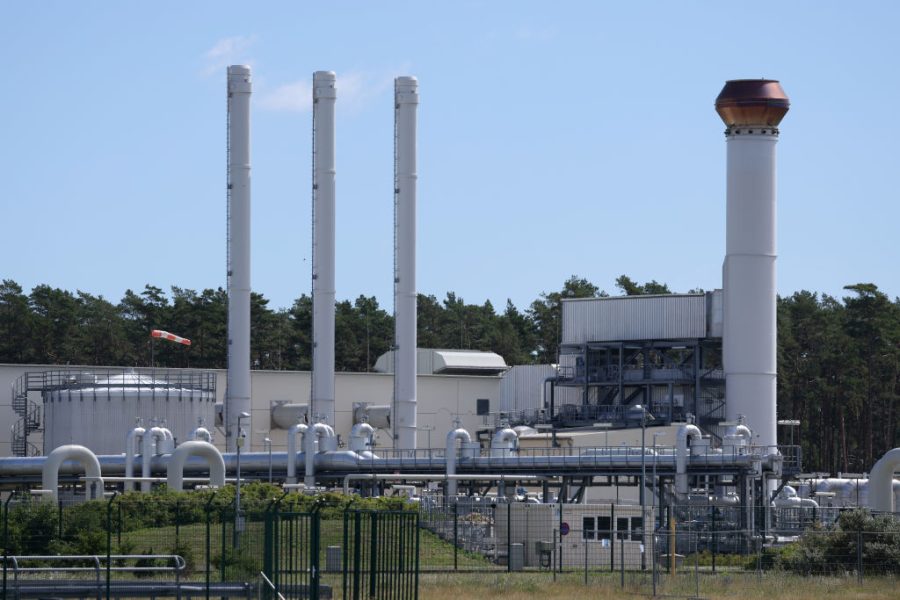Could Gazprom’s Nord Stream undersea gas pipelines, partially destroyed by saboteurs in September 2022, eventually be reopened? This week, Denmark’s energy agency authorised Nord Stream 2 AG – the Russian-owned company that operates the pipelines – to begin work capping the severed ends of the three destroyed pipelines. That will be the first step to restoring the link that before Vladimir Putin’s invasion of Ukraine used to supply up to a 40 per cent of Germany’s gas.
The move comes just days after Alice Weidel, leader of Germany’s Alternative für Deutschland party or AfD, told a party conference in Riesa that ‘we will put Nord Stream back into operation, you can count on it!’ Weidel also promised to ‘demolish all wind turbines’ in Germany and ‘restore the operation of functioning nuclear power plants’.
Europe could – technically – actually double their pre-war imports from Gazprom
But the prospect of going back to business as usual with Russia after a ceasefire in Ukraine – and returning Germany to its strategic reliance on Putin’s gas – is causing consternation among some EU members. Days after Weidel’s remarks, Polish President Andrzej Duda warned that countries such as Germany ‘should not be tempted’ to resume Russian supplies to support their struggling economies.
‘I can only hope that European leaders will learn lessons from Russia’s aggression against Ukraine and that they will push through a decision to never restore the pumping of gas through this pipeline,’ Duda said on Monday.
This pipeline causes a very big threat to Ukraine, to Poland, to Slovakia but also to other Central European countries. It is a threat from the point of view of energy, from the point of view of the military, but also it is a huge economic threat because it means a domination of Russia over Europe.
Rather than repair the €10 billion (£8.3 billion), Russian-funded pipeline, Duda said that Nord Stream should instead be ‘dismantled.’
Yet for German voters – and swathes of German industry – the loss of cheap Russian gas has been disastrous. The double energy shock caused by the destruction of Nord Stream and the closure of Germany’s nuclear power stations on the insistence of Green coalition partners has led to the biggest collapse in German living standards since the second world war and a downturn in economic output comparable to the 2008 financial crisis. According to a recent paper published by the Forum for a New Economy, the failure to protect German industry from the energy price spike may turn the 2020s into ‘a lost decade for Germany’ and further fuel the rise of the AfD.
The EU itself is struggling to square the circle of simultaneously punishing Russia economically and finding sources of gas to keep the lights on. Despite a price cap on Russian oil exports, cutting aviation and banking links, and freezing Russian state assets, Brussels never sanctioned the Nord Stream pipeline itself. Despite over 500 different sanctions on Russia and individual Russians, Europe is now actually importing more liquefied natural gas (LNG) from Gazprom than before the war – with France, Spain and Belgium accounting for the lion’s share of the 17 million tonnes imported in 2024. And though direct gas transit from Russia through Ukraine to Europe was finally cut off on 1 January this year, much of the Balkans continues to import Russian gas indirectly via Turkey.
The Danish energy agency says it approved the repairs because it is ‘obliged under international law to permit the establishment and operation of pipeline facilities on the Danish continental shelf’. The proposed works will, according to the agency, involve installing specially designed waterproof caps on the two blown-up pipes of Nord Stream-1 and one of the pipes of Nord Stream-2. That will allow the flooded pipelines to be pumped dry and – potentially – raised from the 90-meter-deep seabed and repaired. The cost of the patch has been estimated at €622 million (£521 million), according to Nord Stream 2 AG’s administrative receiver, the Swiss-based Transliq AG.
But one of the Nord Stream-2 pipelines remains undamaged, intact, and ready to go. Though that newer pipeline never received final approval from German regulators, it is still pressurised and could, technically, resume pumping immediately. That would provide over half the volume of gas that Nord Stream-1 used to provide before its destruction, solving Germany and Europe’s energy crisis at a stroke. After repairs of the other three pipelines are completed, Europe could – technically – actually double their pre-war imports from Gazprom.
The economic savings over LNG imports could be vast. But the moral cost will be equally enormous. Europe’s coming debate about resuming its dependence on Gazprom is set to be emotional and fraught with accusations of betrayal of Ukraine. But the option of simply turning the gas taps back on is a technical fact. The question is whether future policymakers will be able to resist the temptation.







Comments